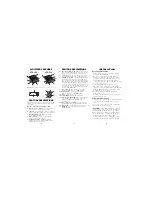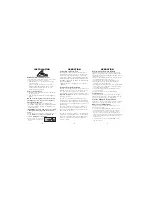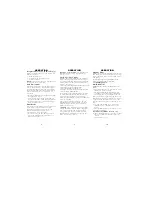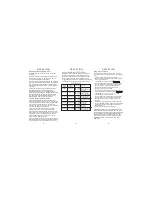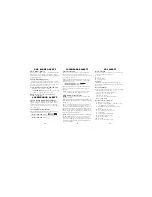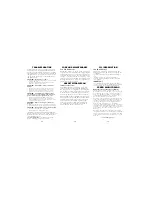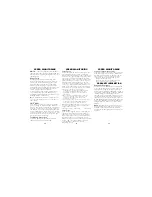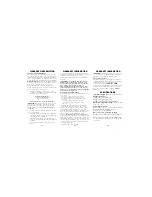
TROUBLESHOOTING
CARE AND MAINTENANCE
FCC INFORMATION
17
18
19
Your Whistler detector is expertly engineered
and designed to exacting quality standards to
provide you with reliable, trouble-free operation.
If your unit has been correctly installed following
the guidelines in this manual, but is not operat-
ing optimally, please refer to the troubleshoot-
ing guide below.
PROBLEM: No display or audio.
• Check fuse in Whistler plug; replace if necessary with
a 2 amp 3AG type.
• Check fuse for lighter socket; replace if necessary.
• Make sure lighter socket is clean.
PROBLEM: Unit alarms when vehicle hits
bumps.
• Check for loose lighter socket; tighten and clean.
• Check connections at both ends of power cord.
Substitute another cord to determine if cord is
defective. Return defective cord to the factory.
PROBLEM: Unit alarms when using vehicle
electrical accessories
(brakes, power mirrors,
power windows, turn signals, horn, etc.).
• Vehicle’s electrical system, including battery and
alternator, may have electrical noise. Install a filter
capacitor
(470mfd. 25 volt or larger capacitance value)
on the back of the lighter socket.
PROBLEM: Remote no longer controls the
detector
• Make sure the remote is pointed at the front display.
• Possible weak or dead remote battery, replace battery.
PROBLEM: Audio alerts are not loud enough.
• Cancel Auto Quiet Mode or City Mode.
• Check audio level setting
(see page 7).
I
f difficulties occur which cannot be solved by infor-
mation in this Troubleshooting Guide, please call
Whistler Customer Service at 1-800-531-0004 or
visit our FAQ page at
www.
whistlergroup
.com/faq-detectors.asp,
before returning your unit for service.
Care And Maintenance
During the summer months, avoid prolonged
exposure to direct sunlight by removing your unit
from the dash when your vehicle is parked for an
extended period of time. Do not spray water,
cleaners, or polishes directly onto the unit. The
spray may penetrate through the openings and
damage the unit. Also, do not use any abrasive
cleaners on the unit’s exterior.
In Most States YES!
Laser-Radar detectors are legal in every state
(with the exception of Virginia and Washington,
D.C., which have local regulations restricting the
use of radar receivers in any vehicle) when used
in automobiles or light trucks (under 10,000 lbs.).
Concerning trucks over 10,000 lbs., the Federal
Highway Administration (FHWA) issued a regula-
tion, effective January, 1994 which prohibits radar
and laser detector use in these types of vehicles
nationally. Prior to the FHWA regulation, laws
existed in the state of New York restricting the
use of radar detectors in trucks over 18,000 lbs.
and in Illinois in trucks over 26,000 lbs.
FCC ID HSXWH17
This device complies with part 15 of the FCC
Rules. Operation is subject to the following two
conditions:
(1) This device many not cause harmful interference,
and
(2) this device must accept any interference
received, including interference that may cause unde-
sired operation.
IMPORTANT
FCC requirements state that changes or modifica-
tions not expressly approved by Whistler could void
the user’s authority to operate the equipment.
SPEED MONITORING
Radar Detector Detectors (VG-2)
The Interceptor VG-2, or simply VG-2, is a
microwave receiver used by police to detect sig-
nals radiated by the local oscillator of a radar
detector. Because its purpose is to identify per-
sons driving with radar detectors, the VG-2 is
known as a ‘radar detector detector’.
The VG-2 is the primary tool used by the police
to identify radar detector equipped vehicles. If
caught, in a state where detectors are illegal,
(see page 18), drivers risk losing their radar
detector and receiving a fine. In addition,
instant-on radar is almost always used in combina-
tion with a VG-2, leaving unsuspecting motorists vul-
nerable to receiving two tickets - one potentially
for speeding, the other for possession of a
detector.
Having a radar detector capable of detecting
the VG-2 may alert you to the presence of a speed
trap. For more information on speed monitoring
technologies, please visit our FAQ page on our
website:
www.
whistlergroup
.com
ARE DETECTORS LEGAL?


